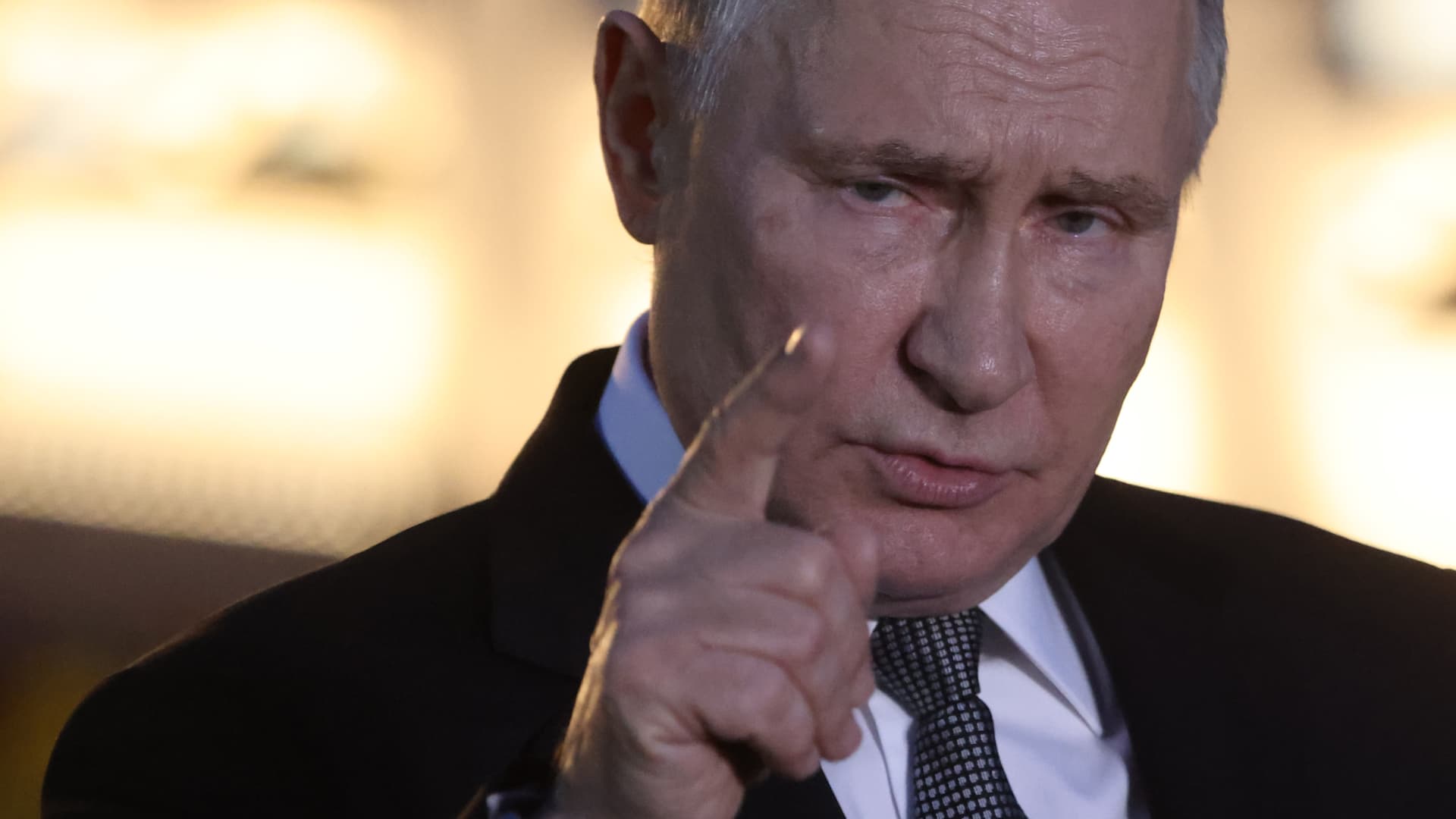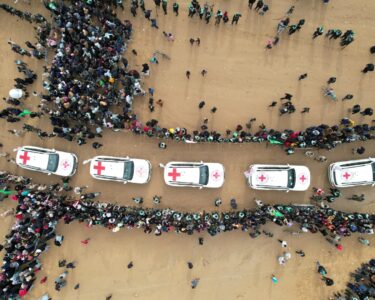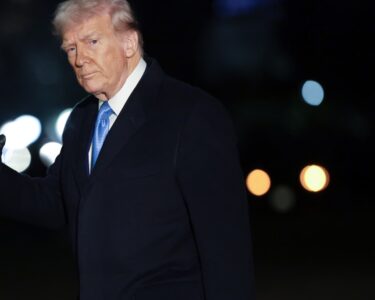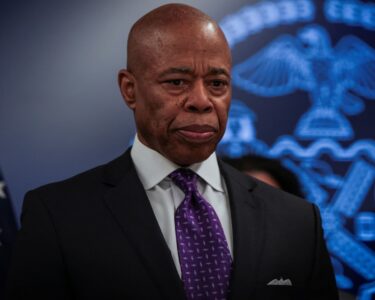This was CNBC’s live blog tracking developments on the war in Ukraine. See here for the latest updates.
U.S. Defense Secretary Lloyd Austin will on Tuesday try to convince Ukraine and other European allies that President Joe Biden’s administration is still committed to supporting Kyiv, even as Washington’s funds run too low for it to be able to do so.
Austin will be leading the Ukraine defense contact group meeting at the Ramstein Air Base in Germany on Tuesday, with representatives from Ukraine and around 50 allied countries attending.
In other news, Moldova’s foreign ministry said it had summoned the Russian ambassador, and had expelled another Russian diplomat, after polling stations were opened in the breakaway region of Transnistria during the Russian presidential election.
France on Tuesday said recent remarks made by Sergei Naryshkin, chief of Russia’s foreign intelligence service, that any French military sent to Ukraine to help fight Russia would be a ‘priority target’ for Russian troops were an ‘irresponsible’ provocation.
“We consider these kind of provocations irresponsible”, an official of the French Armed Forces Ministry said, adding the remarks were a further example of Russian ‘disinformation.’
— Reuters
A legal agreement on sending income from Russian assets to Ukraine could be finalized this week, Poland’s minister of foreign affairs told CNBC Tuesday.
Following Russia’s invasion of Ukraine, around $300 billion of Russian central bank reserves were frozen by the G7 and its partners in March 2022.
“Some people say that the Russian central bank assets should be given to Ukraine after the war for the rebuilding of Ukraine, well I say well how about better to use them to defend Ukrainian citizen infrastructure to prevent the destruction first,” Radoslaw Sikorski told CNBC’s Steve Sedgwick.
Russia has already been told that it will not see this money as it will be required by Ukraine to rebuild after the war, Sikorski said.
“The only question remains is if we give this money to Ukraine after the war or when she needs it the most, which is to say now,” he added.
The foreign minister said that, this week, European foreign ministers decided that “the income from the principal will be given to Ukraine.”
There is an ongoing debate about the legalities and procedures of using income from frozen Russian central bank assets, which are being held by Belgian central securities depository provider Euroclear.
Earlier on Tuesday, Josep Borrell, high representative for foreign affairs and security policy for the European Union, said a proposal about using profits from the frozen assets to fund Ukrainian military aid would be presented to EU member states this week. The assets could bring in around 3 billion euros ($3.25 billion) of profit a year, he said.
— Sophie Kiderlin
If the Ukraine war continues for another one or two years, the Russian economy could be in “serious trouble,” Radoslaw Sikorski, Poland’s minister of foreign affairs, told CNBC Tuesday.
“I think if Ukraine can sustain it for a year or two, the Russian economy will be in serious trouble and then perhaps President [Vladimir] Putin might make different decisions … as to this act of aggression,” he told CNBC’s Steve Sedgwick.
Sikorski added that Russia had already spent around half of its reserve budget.
“If you put your economy on a crisis or war footing, your GDP rises because you are producing more shells and tanks and all the things that are going to get destroyed, but you’re also wasting the resources and the wealth of your country, and this has limits,” he said.
— Sophie Kiderlin
Sergei Naryshkin, chief of Russia’s foreign intelligence service, said on Tuesday that any French military sent to Ukraine to help fight Russia would be a priority target for Russian troops, the TASS news agency reported.
“It (a French contingent) will become a priority and legitimate target for attacks by the Russian Armed Forces. This means that the fate of all Frenchmen who have ever come to the territory of the Russian world with a sword would await it,” Naryshkin said.
French President Emmanuel Macron in late February opened the door to European nations sending troops to Ukraine.
— Reuters
Russian President Vladimir Putin reportedly instructed the FSB, Russia’s security service, to identify and punish anti-Kremlin “traitors” who carried out cross-border raids against Russia, saying they had “committed crimes against Russia.”
At a meeting of the board of the FSB Tuesday, Putin discussed recent attempts by several Russian rebel groups — labeled as “sabotage and terrorist groups” by Moscow — to cross the border from Ukraine into Russian territory.
“When I spoke about these traitors, I ask … [the FSB] not to forget who they are, to identify them by name,” Putin said, according to comments reported by TASS and translated by Google.
Russian border officials reported last week that rebel groups had conducted cross-border raids into the Belgorod and Kursk border regions but Russia’s defense ministry said it had repeled attempted incursions into Russian territory. Ukraine said a number of Russian anti-war armed groups had acted independently.
“We will punish them without a statute of limitations, wherever they are,” said Putin, a former officer in the KGB, a forbear of the FSB, said. Putin has remained close to the security services throughout his 24 years in power.
— Holly Ellyatt
Ukraine’s President Volodymyr Zelenskyy said Tuesday that he’d asked the President of the European Council Charles Michel to consider ways to increase weaponry supplies to Ukraine.
“We discussed further steps on the way to the actual start of negotiations on Ukraine’s accession to the EU, as well as further comprehensive support of Ukraine from the EU … In addition, [we] considered possible ways to increase the supply of artillery ammunition to Ukraine,” Zelenskyy said on Telegram.
The president also thanked the European Council for agreeing on Monday to support Ukraine with military aid worth 5 billion euros ($5.44 billion) through the establishment of a new Ukraine Assistance Fund.
Further military equipment and training, as well as operational support and joint procurement from European defense industries will be supported by the fund, the European Council said in a statement.
There are ongoing concerns over weaponry and ammunition shortages that are being experienced by Ukrainian forces along the front line. Ukraine fears Russia is planning to launch new offensives at the start of summer too, making arms supplies even more critical.
— Holly Ellyatt, Sophie Kiderlin
European Union foreign policy chief Josep Borrell said on Tuesday he will propose that the EU uses 90% of the revenues from Russian assets frozen in Europe to buy arms for Ukraine via the European Peace Facility fund.
The EU’s top diplomat told reporters in Brussels he would propose that the remaining 10% be transferred to the EU budget to be used to boost the capacity of the Ukrainian defence industry.
He said he would submit the proposal to EU member states on Wednesday, ahead of a summit of EU leaders on Thursday and Friday.
A senior EU official said last week that Russian assets frozen in the European Union are likely to generate between 15 billion and 20 billion euros in after-tax profits until 2027, depending on global interest rates.
Some 70% of all Russian assets immobilised in the West is held in the Belgian central securities depository Euroclear, which has the equivalent of 190 billion euros worth of various Russian central bank securities and cash.
Borrell stressed the proposal was to use profits from the assets held in Europe rather than the assets themselves. He said this could yield some 3 billion euros annually. “The concrete proposal will be tabled tomorrow,” he said. “This is for member states to agree.”
— Reuters
Moldova has summoned the Russian ambassador and expelled another Russian diplomat following the opening of polling stations for Russia’s presidential election in the pro-Russian breakaway region of Transnistria.
Moldova’s Foreign Ministry said Tuesday that it had summoned Russian Ambassador Oleg Vasnețov following the ballot in Transnistria last weekend, as Russia held its presidential election.
“The Moldovan side expressed its protest against the presidential elections held by Russia in the Transnistrian region, against Moldovan authorities’ stance,” the ministry said on social media platform X.
“A diplomat was declared persona non grata,” it added, without giving further details.
Transnistria is in eastern Moldova but has a fractious relationship with the rest of the country. Pro-Russian authorities in the region declared the territory independent in 1990, although no U.N. member recognized the move.
Transnistria remains closely allied with Moscow and raised eyebrows last month when it asked for Russia’s “protection” against Moldova, prompting fears that Russia could use the move as a pretext for beefing up its military presence there, or even to annex the region.
— Holly Ellyatt
Russian authorities in the Belgorod region are to evacuate around 9,000 children from the region, which borders Ukraine, because of repeated shelling by Ukraine’s armed forces, the governor said Tuesday.
“Today we are resettling a large number of villages,” Governor Vyacheslav Gladkov said at a United Russia party meeting Tuesday, news agency Tass reported.
“We are now planning to remove about 9,000 children from Belgorod” and several districts in the wider region, he said.
The governor said 16 people were killed and 98 injured because of shelling in the Belgorod region over the past week.
CNBC was unable to immediately verify the claim. Belgorod has been a focal point for repeated Ukrainian strikes against Russian territory, however, although Kyiv rarely comments on such attacks.
— Holly Ellyatt
Putin’s reelection to a fifth term in office at the weekend was one of the least surprising political events so far this year, but it has prompted questions as to what we can expect from another six years of the strongman’s leadership.
Analysts share their views on what we can expect now that Putin has strengthened his grip on power, with the Ukraine war, domestic economic reforms and a possible government reshuffle key factors to watch.
Read more on the story here: War, reforms and a possible successor? Here’s what we could see from 6 more years of Putin
— Holly Ellyatt
Polish President Andrzej Duda said Monday that NATO must urgently increase its defense spending to ensure it does not become the next target of a Russian attack.
Speaking to CNBC, Duda cited unspecified German research which suggests that Russian President Vladimir Putin is doubling down on his shift toward a war economy with a view to attacking NATO in 2026 or 2027.
“The alarm bells are ringing,” he told Steve Sedgwick, according to a translation.
Duda said it was therefore more critical than ever to ramp up the alliance’s military spending to 3%, describing his increased target as “common sense.”
— Karen Gilchrist
U.S. Defense Secretary Lloyd Austin on Tuesday will try and convince European allies that President Joe Biden’s administration is still committed to supporting Ukraine, even as Washington has essentially run out of money to continue arming Kyiv and few signs that Congress will move to replenish funds.
Republican House of Representatives Speaker Mike Johnson has so far refused to call a vote on a bill that would provide $60 billion more for Ukraine and the White House has been scrambling to find ways to send assistance to Kyiv, which has been battling Russian forces for more than two years.
Austin will be leading the monthly meeting known as the Ukraine defense contact group (UDCG), held at Ramstein Air Base in Germany, of about 50 allies that have been militarily supporting Ukraine.
The Pentagon said Austin, who is making his first overseas trip since a prostate cancer treatment, will reiterate that Washington is committed to Ukraine. But officials say the lack of funding available is already having an impact on the ground in Ukraine and Ukrainian forces are having to manage scarce resources.
Last week the Biden administration said it would send $300 million in military assistance to Ukraine, but added that it was an extraordinary move after unexpected savings from military contracts the Pentagon had made.
Officials have not ruled out that they could find additional savings, but they say that amount would not be enough to make up for the lack of Congressional action. Experts say that Austin will face a skeptical audience in Europe.
— Reuters
Russian President Vladimir Putin briefly attended an open-air rally in Moscow on Monday evening at which he told the crowd that the annexation of Crimea and other regions in Ukraine had been difficult but worthwhile.
The rally and concert in Red Square marked the 10th anniversary of Russia’s annexation of Crimea from Ukraine. The annexation was a precursor to a simmering conflict between pro-Russian separatists and Ukraine’s armed forces in eastern Ukraine since 2014, and Russia’s wholesale invasion of Ukraine in 2022.
Since then, Russia has also illegally annexed four other partially occupied regions in Ukraine, attempting to “Russify” the regions and holding voting there ahead of the three-day Russian presidential election last weekend that Putin won. Ukraine condemned the ballots held on its territory, describing them as illegal.
Putin told a large, flag-waving crowd that the “return” of those other regions to Russia had turned out to be “much more grave and tragic” than Crimea’s, but said that it had been accomplished, Reuters noted.
Putin also told the crowd that rail links had been restored from Rostov in southern Russia to the Russian-occupied cities in eastern and southern Ukraine, and would soon also connect directly with Sevastopol in Crimea.
“Just this morning, I was informed that the railway from Rostov to Donetsk to Mariupol and Berdyansk has been restored. We will continue this work. Soon trains will pass directly to Sevastopol. And this will be another alternative road to the Crimean bridge,” he said, in comments translated by Reuters.
— Holly Ellyatt
Debate around military aid to Ukraine is deepening the cracks in Germany’s administration — but despite “extremely unusual” public rifts, Chancellor Olaf Scholz is expected to prevail.
The question at the heart of a months-long dispute is whether Germany will send Ukraine long-range Taurus missiles, which can independently locate and destroy a target after being released by a carrier.
Scholz has firmly rejected Kyiv’s request for these missiles — but he looks increasingly isolated in this position.
One key concern is that Ukraine may need on-the-ground help from German soldiers to work the Taurus missiles — a red line for Scholz.
According to leaked discussions by senior army chiefs reported by German media, there are very few copies of the complex data needed to program Taurus missiles. It means that Germany itself would likely lose access to the material if it handed those over to Ukraine, making it a potentially risky move.
Read more on the story here: Germany’s refusal to send ‘Taurus’ missiles to Ukraine is highly contentious — but won’t break the government
— Sophie Kiderlin
Pictures show the aftermath of shelling in multiple Ukrainian towns that have been attacked by Russia in recent days.
— Sophie Kiderlin
Russian President Vladimir Putin was upbeat after winning a fifth term in power in Russia’s presidential election over the weekend.
He chose his victory speech to supporters and the Russian press to make his first public remarks on the death of his political nemesis, Russian opposition leader Alexei Navalny, mentioning his name for the first time in years.
When asked by NBC’s Keir Simmons about the death, Putin responded by calling his death a “sad event” and claiming he had been prepared to involve Navalny in a prisoner swap with the West.
Click here to read more on this story: Putin talks about his nemesis Navalny’s death for the first time as he basks in election win
— Holly Ellyatt
The European Union pronounced that Russian presidential elections took place in an “ever-shrinking political space” that violated civil and political rights, after Vladimir Putin secured another six-year term.
“Russian authorities have continued to increase the systematic internal repression by cracking down on opposition politicians, civil society organisations, independent media and other critical voices with the use of repressive legislation and politically motivated prison sentences,” the EU said in a statement out Monday.
The circumstances in which the elections were held “deprived Russian voters of a real choice and heavily limited their access to accurate information,” the bloc added, while also condemning presidential votes carried out by Russia in occupied territories of Ukraine.
— Ruxandra Iordache
Vladimir Putin’s sweeping win in Russia’s presidential vote over the weekend was a “unique” result, Kremlin spokesperson Dmitry Peskov said, defending the electoral process from Western accusations.
In Google-translated comments reported by Russian state news agency Tass, Peskov said that foreign statements questioning the legitimacy of the election were “absurd,” noting that he expected international congratulations for Putin’s victory to continue pouring in for more than one day.
The European Union has criticized the circumstances under which Putin secured over 87% of the popular vote, stressing a restrictive political environment and a lack of genuine opposition in the electoral race. It also refused to acknowledge the polls held in Ukrainian territories occupied by Russia.
— Ruxandra Iordache
Western leaders slam Putin’s election win as ‘illegitimate’; Ukraine hit with new wave of drone attacks






